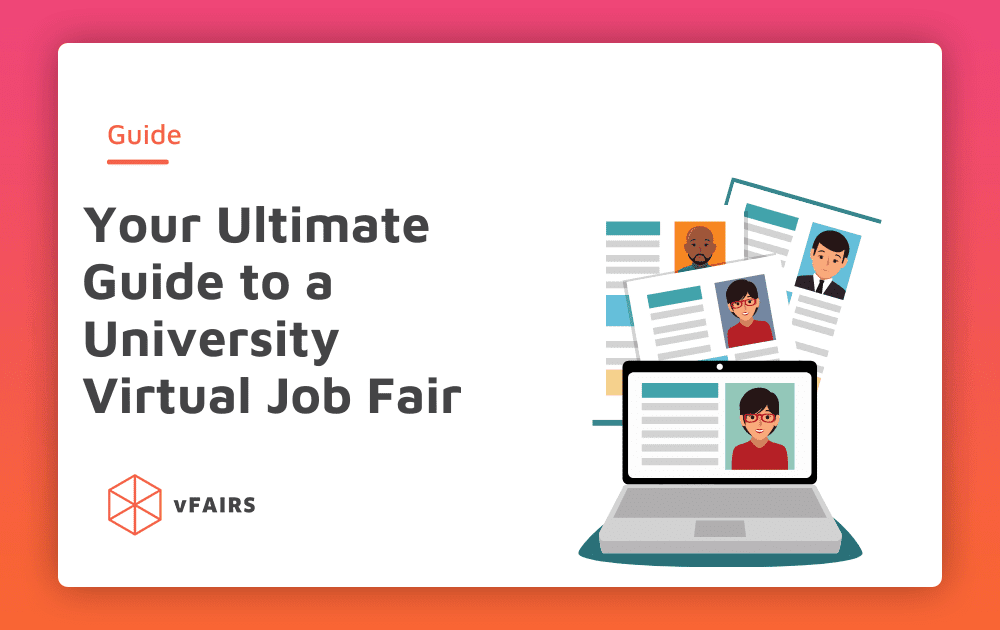A university virtual job fair is a great way to offer your students an immersive experience that helps them in their job search process. If you’re interested in hosting such an event, then you need to follow a few guidelines to get the most traction out of it. You need to make your virtual job fair a positive experience for your students and partner employers. . This guide covers everything you need to know to host a successful fair.
What Is a University Virtual Job Fair?

A job fair is basically an event where a number of companies come to a university’s venue to scout potential employees. Usually, they set up booths at a physical venue, inform students about open positions and shortlist qualified applicants. Many universities also offer speaker sessions and panel discussions. These could be on the job search process or enable employers to go more in depth about their brand concept, work culture and open positions.
Its virtual counterpart uses a virtual job fair platform to bring together students and employers on an online platform. Such an event lets you invite more companies from across the region and also makes it easier for your students to attend. It just takes all the above-mentioned features, and presents them in a digital format for convenience. Therefore, it is quite a viable option with a long list of advantages.
Benefits of Virtual Career Fairs
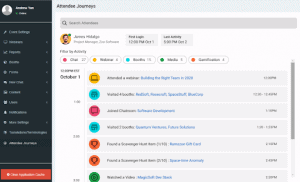
There are numerous benefits of hosting a university virtual job fair instead of a conventional physical event. These benefits extend to all of the people involved, so you should definitely look into the virtual or hybrid format for your upcoming career fairs. Here are some of the major benefits you can reap.
Accessibility
The first major benefit of a virtual career fair is that it is extremely accessible. Companies won’t have to plan a quarter in advance to set up a stall at your university and allocate resources for the purpose. In addition, students won’t have to make their way physically to the venue.. This also opens the event to your student and alumni body based across the globe.
Cost-Saving
You’ll be glad to know that you can save tens of thousands dollars if you opt for a virtual job fair rather than a physical one. This is because you don’t have to go through the headache of setting up your venue, building stalls, and also arranging refreshments. Furthermore, you won’t have to worry about logistical costs, such as flying in speakers, getting paper supplies, hiring staff, arranging security, and accommodating guests. All of these costs add up day by day at physical events.
Instead, you can allocate these resources to more productive purposes, such as approaching top-notch companies for the event. This is because virtual fairs are available at any time you want, with minimal mounting costs if the event goes on for a long time. Therefore, you stand to save significantly if you switch to the online model.
Variety
If you only host physical events, you might be left with a few local companies at your job fairs, unless you’re a major institution. However, a virtual event gives you more leeway with the companies and guests you can invite. You’re not bound by geographical and logistical constraints, so you can simply aim for the top.
Furthermore, you’ll have a wider variety of industries for your students to explore. And within those industries, they’ll have various options for their needs. With more variety, you’ll get more success cases, so virtual is the way to go.
Communication
When you host a conventional career fair, you cannot encourage as much open communication as you’d like. This is because the exhibitors will be working their own booths, and visitors will be milling in and not getting as much time to explore their career options. There are usually really long lines at physical events and not enough time for students to make an impression on a recruiter or company representative. Furthermore, physical fairs create inequity for shy students who might get overwhelmed
With virtual fairs, you can open up multiple communication channels for both visitors and exhibiting companies. This will increase engagement and conversations around your event, so also contribute to your reach. vFairs has online chat features for this purpose, with a diverse set of functions to meet a diverse set of needs. In addition, the online aspect is helpful for shy students as well, and gives them the confidence to gather the information they need.
Trackability
What’s really missing from physical events is a reliable way to gauge attendance and engagement. With virtual job fairs, you can easily track all the relevant metrics from the back-end. These metrics cover footfall, quality of interaction, leads generated, and many other factors. Therefore, they’ll give you a complete picture of how your event performed, and where your problem areas lie.
So, you can use these metrics to plan your next virtual job fair in a better way and get even more traction than before. These statistics are extremely simple, so you won’t need to have any technical expertise to translate them.
How to Host a University Virtual Job Fair
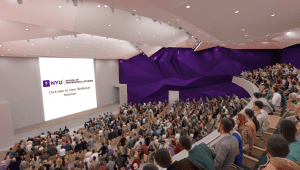
When you host a university virtual job fair, you need to make sure you have a proper plan in place and implement it efficiently. Therefore, you should follow a few simple steps to ensure it runs smoothly.
Make a Detailed Plan
First of all, draft a clear and concise plan, with everything from initial goals to end results. This plan includes the date and time of the fair, your budget, your tentative guest list, and the agenda for your virtual job fair.
Draft this in a written form, and share it with the relevant stakeholders. You can also use this plan as a pitch template for sponsors and companies you want to invite.
Pick Your Hosting Platform
A virtual job fair isn’t simply a matter of hosting a few video calls. It is an intricate process with lots of aspects involved. If you want a high-quality event, you need to get the best
platform you can find. vFairs is a great option, as it does everything from setting up your event to offering you complete insights during and after the fair.
So, you should definitely use a virtual event hosting platform to take care of all the hassle, so that you can focus on the other elements of the event, such as attracting companies and ensuring your students get the right job placements they deserve.
Invite Organizations
Now, you can move on to the next step. Make a list of companies that you want to invite. This could include organizations that:
- have previously attended your job fairs
- are relevant to your academic departments
- your students are interested in
Create proper invite packets, complete with stall setup details and instructions on how to handle the digital aspect of the event and send them out.
Try to get as diverse a list of companies as possible, so there are more hiring opportunities. You can address the invitation to the company president or the human resources director. Remember to track responses in a spreadsheet.
Send Out Invites
Then, you should send the invites and notifications to your students. Clearly communicate the schedule, and let them know what to bring to the event. Remember to have them prepare their CVs and other such documents companies require for the hiring process.
In addition, send reminders on dressing well, so that if a video interview takes place, they’re not caught off guard. It’s also a good idea to share the list of companies, so that they can do some pre-fair research and plan who to visit before they attend the event.
Gather Reports
You’ll receive a number of excellent data insights during your event. This includes attendance metrics, engagement metrics, and general event success. At virtual job fairs, these statistics include successful recruitments over time as well.
Therefore, you should use a tool to gather these insights and translate them as comprehensively as possible. These reports will help you plan future events, and also improve your students’ future prospects.
So, this is how you can prepare for your virtual career fair. These hosting tips will help you be more organized on the actual day of the event, and just deal with running it properly.
10 Must-have Virtual Job Fair Platform Features

There are a number of features you must have at your university virtual job fair. These features cover most of the aspects of a job fair and also include some refreshing recreational activities for your students.
Here’s a list of features which can contribute a lot to your events.
1. Dynamic Lobby
The virtual lobby is a gateway to your event. Students will interact better with a dynamic lobby, where they can engage with various elements, and also see some action going on.
2. Immersive Exhibit Hall
Visitors love to get the physical event experience on a virtual platform. An immersive exhibit hall lets them interact with booths in such a way that they feel like they’re at a physical event, complete with swag bags and face-to-face meetings.
3. Auditorium
This is where a lot of the webinars, discussions, and talks happen. Just like a real auditorium, there are timings for live talks. However, in virtual auditoriums, you can revisit these sessions at your own convenience.
4. Help Desk
Get all the information you need about the event and its various proceedings from the help desk. Its representatives will let you know where to go, let you know about the agenda, and guide you accordingly.
5. Chat & Networking Features
Help your audience emulate event interaction with each other by offering chat and networking features. This will let them strike up formal and informal conversations with each other, and get to discuss various career options.
6. Meeting Scheduler
When companies want to set up future meetings or interviews with students, they can use the meeting scheduler. This automatically integrates into their calendars and lets students lock interview dates if a company shortlists them at the event.
7. Job Board
Similar to a social media wall, a job board in the lobby is a very helpful tool. It can let students know which companies are offering what kinds of jobs, and then plan their booth visits accordingly.
8. Gamification
Adding elements like leaderboards and scavenger hunts keeps students engaged with the event. For most of these visitors, this is a first step into professional life, so they need to be introduced to it in a way they can enjoy.
9. Swag Bag
Students can add all the resources and marketing collateral that interests them to their swag bag. These resources can then be downloaded or emailed.
10. Customer Support
You must find a platform which offers consistent customer support. If you face any technical issues as a host, then you want a quick response so that your event can resume normally.
Tips to Find the Best Virtual Career Fair Platforms
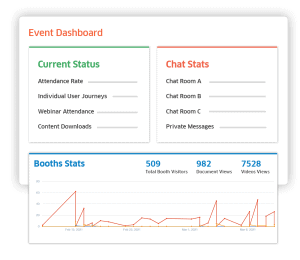
When you’re planning a virtual fair, you need to find the right platform for the job. After all, you do not want to end up stuck with basic technical issues on the day of the event if you make the wrong choice.
Instead, once you choose correctly, your whole experience will go smoothly, with barely any hiccups in the process. Here’s how you can narrow down your choices and pick the perfect platform for your requirements.
Do Your Research
First of all, do not get the first thing you see. Instead, do your research online and see what sort of services each platform offers. Some of them may only offer basic hosting, while others offer the whole suite of services, from registration landing pages to post-event performance analytics.
Therefore, you should shop around. This will also help you compare pricing and be in a position to pick something which works best for you. The internet is your best bet in this regard, but watch out for shady offers which claim unbelievable numbers at low costs. After all, if something looks too good to be true, it usually is.
Consider Your Budget
This is probably one of the major concerns you’ll have. Think of the budget you earmarked when you were planning your event. See what sort of platform and services your budget can get you. If you can make do with a barebones event, then you can get practically any option.
However, if you have a good budget, you have a lot more options, both with platform choice and the number and type of features you choose. Therefore, your budget should be a guiding principle in your choices.
Check the Features
Make sure the platform you choose has the features mentioned previously. Some platforms may have all these features, while others may just have a few. If you want to include the whole list in your job fair, then you need to go for the former option.
Otherwise, you’ll end up working with more than one platform, which can get quite expensive and inconvenient. After all, each platform will have its own complexities, so you’ll have multiple balls in the air. Therefore, you must always enquire about the features an event hosting platform offers before deciding to use them for your university job fair.
Look at Reviews
Go to websites like G2 and Capterra to see how users have reviewed your shortlisted platforms. These sites also let you compare user experiences, ratings, and features, so they are quite helpful. Make sure you try and find reviews relevant to virtual career fairs, so that you can see how the platform performed.
These reviews will give you a clear and unbiased view of the platform’s approach to event hosting and their knack for event success. Therefore, this is a step you must not miss. Furthermore, once you’re done with an event, also leave your own honest review on these websites so that others can benefit from your experience.
Determine Level of Customer Support
If a platform just lets you use its technology and doesn’t really offer anything beyond that, steer clear. Otherwise, you may find yourself mired with issues on the day of the event, with no idea how to solve them.
A good virtual event hosting platform will give you constant customer support before and during the event. In addition, it will resolve any technical issues on a priority basis. Therefore, go for a platform which offers you consistent customer and technical support. This will help you give your visitors and exhibitors a smooth experience.
University Virtual Job Fair Examples

Here are a few examples of virtual job fairs successfully completed by vFairs. All of these events worked out quite well, and proved the platform’s capability to handle large-scale events with multiple elements.
1. The Unilever Connect: Interactive Career Fair
https://www.vfairs.com/unilever-turkey-redefines-recruitment-with-interactive-virtual-career-fair/
2. Atos Virtual In-House Day 2021
https://www.vfairs.com/atos-vfairs-virtual-in-house-day/
Virtual Job Fair Tips for Employers
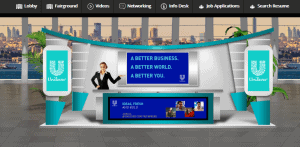
Now that we’ve covered university virtual job fair guidelines for hosts, here are a few tips for employers. If you’re a recruiter who’s decided to be part of one of these virtual career events, here are a few tips you should follow.
Become an Event Sponsor
If you become an event sponsor, then you won’t only get sponsor-specific event perks, but also get ample marketing. Depending on your sponsorship package, your company’s name will appear on the event lobby and marketing collateral, offering lots of exposure.
Host a Webinar
You can host your own webinar in the event auditorium. Work with hosts to arrange this, and give a basic introduction about your company, complete with the values and culture you embody. This will help students know whether they’ll be a good fit for your organization or not.
Take Notes
You need to make sure you take notes so that you can keep track of your interactions with students. Use tages and make notes in chat so that you can compare them with the relevant people in your organization and reach out to potential candidates.
Set Up Attractive Booths
If you have appealing booth layouts with a distinct sheen of quality, then more prospects will veer towards you. Therefore, you should include video content, simple presentations, graphic flyers, and detailed brochures. Also focus on booth design and make it as interactive as possible.
Keep Well-Informed Representatives
Do not just allocate the new intern to stay online for a college job fair. This is because students will have a list of complex questions about your company and its job openings. You need qualified and well-informed representatives to cement your company’s reputation as a top-notch employer.
Make Your Requirements Clear
Clearly display your list of job openings in your booth. You can even include a sign-up formwhich interested students can fill. This will help steer only relevant candidates towards you, and also save a lot of time.
You need to make your requirements and job descriptions clear before things get any further with your booth visitors. Of course, if you’re coming to a university event, you can’t expect to find candidates with 5 years of experience or whatever.
Instead, you need to have realistic expectations and display your eligibility criteria clearly. Otherwise, you’ll waste everyone’s time, including yours.
Schedule Meetings with Potential Candidates
You don’t want your event experience to be swamped by constant face-to-face meetings with potential candidates. Instead, you can use profile search and resume filters to shortlist candidates. After shortlisting, use the meeting scheduler to invite interesting candidates for an interview.
At events hosted by vFairs, your chat rooms will have an integrated calendar, which you can use for this purpose.
There you have it. All you need to know about hosting a successful online job fair for your university students. The best events involve a lot of research and planning. We hope that you find our tips and examples helpful as you set up your next online fair.
If you’d like to learn more about online events you can host as a university, check out our Complete Guide to Virtual Events for Universities.

